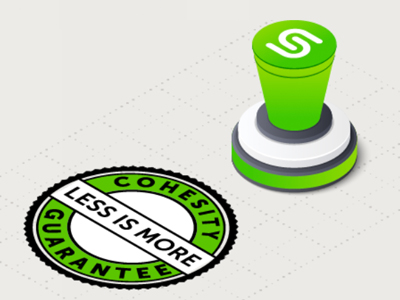Would you build an addition to your house when you ran out of closet space? Of course not; you’d sort through your closet and discard items that are old or duplicates. You might buy one of those storage bags that vacuums out the air to compress the space required.
Yet when it comes to storing data in our data centers, most of us act as if the solution is to add additional storage devices. That makes room for new data, but it’s costly. Beyond the initial purchase and installation costs are the ongoing costs for support and maintenance.
It’s cheaper and more effective to find better storage that lets you store more in the same amount of space. Cohesity NAS SmartFiles meet today’s data demands, with the ability to reduce storage requirements, make data more accessible, and cost less. Cohesity even guarantees their storage devices provide a lower total cost of ownership.
The Problems of Conventional NAS
Conventional NAS provides scale-out storage to grow with the demand, but all it does is store the data. That was fine for secondary storage a few years ago, when secondary storage was of low importance, but today, secondary storage houses vast quantities of historic and unstructured data that feeds critical data analytics projects. Managing this data effectively so that it can produce value isn’t a feature of traditional storage.
Cohesity NAS SmartFiles Features
In contrast, Cohesity NAS SmartFiles make data searchable, accessible, and usable. There are four features to reduce data size:
1. Variable-length deduplication. Traditional deduplication requires fixed block sizes. Cohesity uses variable length blocks, enabling more effective deduplication.
2. Cross-volume deduplication. Data is shared widely within organizations, and copies of data reside on multiple volumes. Traditionally, deduplication was applied at the volume level, meaning all those extra copies remain unreduced. Cohesity applies deduplication across volumes, with the broader application resulting in more deduplication.
3. Data compression. Different algorithms used for data compression have different results. Cohesity uses modern algorithms that result in higher reduction ratios.
4. Small file capacity optimization. Traditional storage with fixed blocks end up wasting space when a small file is stored in a large block. Cohesity SmartFiles manage small files in ways that eliminate the wasted space.
Cohesity NAS has numerous other features that don’t reduce file size but simplify storage management in the data center. Given the risks of malware and especially ransomware, Cohesity’s security features need to be highlighted. With an immutable file system and built-in encryption, along with malware detection features, Cohesity NAS doesn’t just store data, it keeps it safe.
Use Cases for Cohesity NAS
Almost any business that generates high volumes of data can benefit from using Cohesity NAS for content management and big data purposes. Cohesity NAS also is cost-effective for maintaining archives and video libraries. Industries such as financial services and legal services, which generate large volumes of data, have regulatory retention mandates, and need the ability to search unstructured text will also benefit.
VAST IT Services supports Cohesity and firmly believes in the financial benefits of deploying Cohesity NAS. Contact us to learn more about the Cohesity NAS guarantee and why you should incorporate Cohesity as a key technology in your data center.


